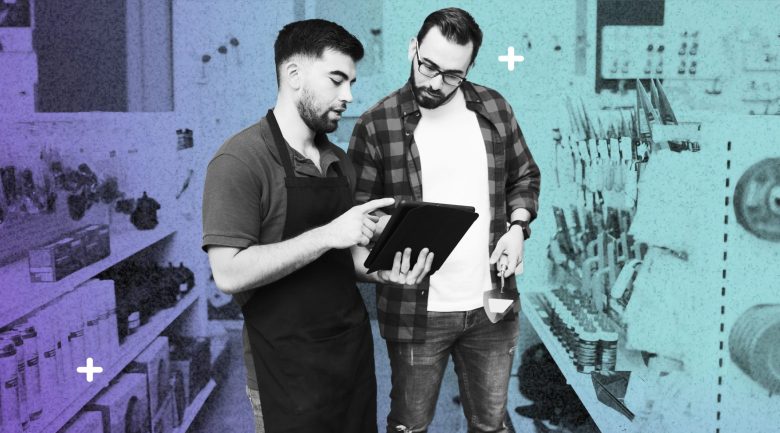The world of e-commerce is evolving rapidly, and personalization is at the forefront of this transformation. For small businesses, staying competitive means delivering shopping experiences that feel tailor-made for each customer. Thanks to artificial intelligence (AI), this level of personalization is no longer reserved for big corporations with massive budgets. AI is leveling the playing field, enabling small businesses to create highly personalized online shopping experiences that drive engagement, loyalty, and sales. Here’s a glimpse into the future of personalized online shopping with AI for SMBs.
Hyper-Personalized Product Recommendations
AI-powered recommendation engines are already transforming how customers discover products, but the future holds even more potential. Advanced algorithms will analyze not just past purchases and browsing history but also real-time behavior, such as how long a customer hovers over a product or what they click on next.
For example, a small boutique could use AI to recommend outfits based on a customer’s style preferences, recent searches, and even the weather in their location. These hyper-personalized suggestions will make shopping feel intuitive and effortless, increasing the likelihood of a purchase.
AI-Driven Visual Search
Visual search is set to revolutionize how customers find products online. Instead of typing keywords, shoppers can upload images or use their camera to search for similar items. AI tools like Google Lens and Pinterest Lens are already paving the way for this technology.
In the future, small businesses could integrate visual search into their websites, allowing customers to snap a photo of an item they like and instantly find similar products in their store. This seamless experience will make it easier for customers to find exactly what they’re looking for, boosting satisfaction and sales.
Voice Commerce and Conversational AI
Voice assistants like Alexa and Google Assistant are becoming increasingly popular, and AI is making it easier for small businesses to tap into this trend. Conversational AI will enable customers to shop using voice commands, ask questions about products, and even receive personalized recommendations.
For instance, a customer could say, “Find me a pair of running shoes under $100,” and an AI-powered voice assistant would instantly provide options tailored to their preferences. This hands-free shopping experience will appeal to busy customers and open up new opportunities for small businesses.
Predictive Personalization
AI will take personalization a step further by predicting what customers want before they even know it themselves. By analyzing data like past purchases, browsing behavior, and even social media activity, AI can anticipate customer needs and proactively suggest products or services.
For example, a small business could use AI to send a personalized email featuring items a customer is likely to need based on their purchase history, such as replenishing a skincare product or upgrading a tech gadget. This proactive approach will make customers feel understood and valued.
Immersive Augmented Reality (AR) Shopping
Augmented reality (AR) is transforming the way customers interact with products online. AI-powered AR tools allow shoppers to visualize how products will look in their homes or on their bodies before making a purchase.
In the future, small businesses could use AR to let customers “try on” clothing, test furniture placement in their living room, or see how a new paint color would look on their walls. This immersive experience will reduce uncertainty and increase confidence in purchasing decisions.
Dynamic Pricing and Personalized Offers
AI will enable small businesses to implement dynamic pricing strategies that adjust in real time based on customer behavior, demand, and competitor pricing. Additionally, AI can create personalized offers and discounts tailored to individual shoppers.
For example, a small business could use AI to offer a loyal customer a special discount on their favorite product category or provide a time-sensitive deal based on their browsing history. These personalized incentives will drive conversions and foster loyalty.
Seamless Omnichannel Experiences
The future of online shopping is not limited to websites—it extends across multiple channels, including social media, email, and mobile apps. AI will help small businesses create seamless omnichannel experiences by unifying customer data and delivering consistent personalization across all touchpoints.
For instance, a customer who browses products on Instagram could receive personalized recommendations via email or see the same products featured in a mobile app. This cohesive experience will make shopping more convenient and enjoyable.
AI-Powered Customer Support
Customer support will become more personalized and efficient with AI-powered chatbots and virtual assistants. These tools will handle routine inquiries, provide instant answers, and even offer product recommendations based on customer preferences.
For example, a small business could use an AI chatbot to guide customers through the purchase process, answer questions about sizing or availability, and suggest complementary products. This level of support will enhance the shopping experience and build trust.
Ethical and Transparent Personalization
As AI becomes more integrated into online shopping, customers will demand greater transparency and ethical practices. Small businesses will need to ensure that personalization is based on data collected with consent and used responsibly.
For instance, businesses could use AI to explain why a product was recommended or how a discount was calculated. This transparency will build trust and reassure customers that their data is being used to enhance their experience, not exploit it.
Choosing the Right AI Tools for Your Business
To stay ahead in the future of personalized online shopping, small businesses will need to adopt the right AI tools. Some platforms to consider include:
- Klaviyo: For personalized email marketing and automation.
- Google Lens: For visual search capabilities.
- Zendesk Chat: For AI-powered customer support.
- Dynamic Yield: For predictive personalization and dynamic pricing.
Start with one or two tools and expand as your needs grow.
The future of personalized online shopping is bright, and AI is at the heart of this transformation. From hyper-personalized recommendations and visual search to voice commerce and immersive AR experiences, AI offers small businesses the tools they need to create shopping experiences that delight customers and drive growth.
By embracing these technologies, small businesses can compete with larger players, build stronger customer relationships, and thrive in the ever-evolving world of e-commerce. The future of shopping is personalized, and it’s powered by AI.




